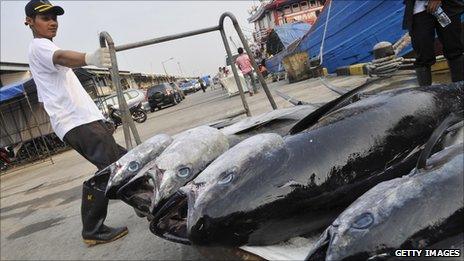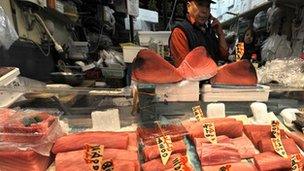Bluefin tuna protection system 'full of holes'
- Published
Clip from Life on the Edge: Looting The Seas
An international system of tracking tuna - a vital tool in the preservation of stocks - has been found to be full of gaps, reports Steve Bradshaw.
In Japan, diners are being urged to curb their craze for one of their favourite kinds of sushi - unless Mediterranean suppliers can prove it is legally and sustainably caught.
Masanori Miyahara, chief counselor of the Fisheries Agency of Japan, said consumers may have to "just forget about tuna for the time being."
Favoured for its soft red flesh, bluefin tuna is prized by sushi lovers around the world, but Japan consumes about 80% of the global supply.
"You have a wide variety of nice fish around Japan at very reasonable prices," he says.

Japan consumes about 80% of the global supply of bluefin tuna
Mr Miyahara's comments come ahead of a conference in Paris on 17 November, which could decide the fate of the endangered Atlantic bluefin tuna.
Spawning stocks of Eastern Atlantic bluefin tuna - the kind caught in the Mediterranean - are widely estimated to be down by around 75% in the last four decades, and some scientists believe they might be on the verge of collapse.
Mr Miyahara's culinary intervention is a result of continued Japanese concern that too many European suppliers of the huge, sleek fish cannot prove they are following the rules.
The Washington-based International Consortium of Investigative Journalists (ICIJ) - which has spent months analysing the trade - calculates that more than one in three bluefins caught in the Eastern Atlantic and Mediterranean between 1998 and 2007 was fished illegally.
The illegal catches gave rise to an off-the-books trade in bluefin tuna, conservatively valued at $4 billion, according to ICIJ.
'Missing'
In Japan, Mr Miyahara is particularly concerned about the Bluefin Tuna Catch Document (BCD), a paper-based system of tracking tuna introduced in 2008.
The BCD is collated by the Madrid-based secretariat of ICCAT, the International Commission for the Conservation of Atlantic Tunas.
It is meant to be a vital tool in the preservation of stocks, attaching a number to each catch or net-load so it can be followed from vessel to market.
In theory the BCD also enables ranches and exporting countries to prove their catch is legal - and within the quotas set by ICCAT's governing commission of tuna-trading member states.
But Mr Miyahara has described some BCD entries as "weird", and Japan has refused to accept thousands of tonnes of Atlantic bluefin, alleging suppliers cannot demonstrate it is legally caught because the paperwork is not in order.
The BCD database is secret and password-protected, but ICIJ reporters were given access by a host country.

Dr Fromentin says there was no political will to enforce the fishing quota
"You can use this for really good things, but there are so many holes in this data that it's not much better than a pile of papers," said the ICIJ's Kate Willson.
"You're looking at about 80% of all of the purse seine catches missing something: it doesn't have a country, it doesn't have any kind of import information - some information that would let me know if this fish was legal."
Most tuna is now caught at sea by purse seine fishermen, and then taken live into ranches where it is fattened.
'Stabilised'
In some cases, the ICIJ found entries where more tuna were apparently leaving ranches rather than entering them - a discrepancy that cannot be explained by breeding.
The big Western European fishing nations - Italy, France, Spain - have started to clean up their act after years of often illegal overfishing.
"You have to realise that within the bluefin tuna, all the countries were lying," says Dr Jean-Marc Fromentin of ICCAT's own scientific committee.
"There was just no political will to enforce the rules, most notably the quota," he added.
Asked about the ICIJ findings, ICCAT's Executive Secretary Driss Meski said: "We are explaining to contracting parties the difficulties we are facing using these [BCD] documents. And we are having difficulties."
"It's not perfect yet. We still need to improve the system," he said.
Mr Meski insists there is still ground for optimism. He will tell the Paris conference that, according to ICCAT scientists, there is a 60% chance that bluefin tuna stocks can be stabilised at an annual catch between 13,500 tonnes and zero.
"The situation is not as bad as we thought and there are some possibilities," he said. "If we adopt several management measures with precaution, we can have a better management situation and the stock could be rebuilt."
'Bloody mess'
The Japanese, for their part, are going out of their way to show that they care about the sustainability of the fishery, particularly after Japan led an effort earlier this year to defeat a proposal to ban the Atlantic bluefin trade by the UN-backed Convention on International Trade in Endangered Species (Cites).

Japan consumes about 80% of the global supply of bluefin tuna
But new fleets - in less-regulated places from Turkey to Libya - are ramping up their operations.
And according to EU Fisheries Commissioner Maria Damanaki, that could pose fresh difficulties.
"We have problems with our member states, but also with our neighbours," says Ms Damanaki.
"I am coming from a Mediterranean state - so I can say it: in the Mediterranean, compliance is not our strong point."
Ms Damanaki insists she will do all she can to make bluefin stocks sustainable.
But with the BCD system "a bloody mess", according to Dr Fromentin, there is still no guarantee that the years in which bluefin stocks were secretly looted are over.